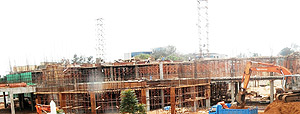RWANDA registered US$400 million in Foreign Direct Investment (FDI) inflows last year, reflecting investor confidence in the country’s economy as government continues to rollout business friendly reforms.


RWANDA registered US$400 million in Foreign Direct Investment (FDI) inflows last year, reflecting investor confidence in the country’s economy as government continues to rollout business friendly reforms.Foreign investments climbed sharply by 266 per cent, from US$109 million a year earlier boosted by Airtel’s US$110 million investment, according to statistics from Rwanda Development Board (RDB)."The fluctuations over the years are because FDI projects are usually few, but can be big in value. One project can, therefore, make a difference in any given year,” Clare Akamanzi, the Chief Operations Officer of RDB told Business Times an email interview.While total investments increased to US$626 million up from US$398 million, local investments registered a slight increase, which highlights the need to speed up the implementation of reforms aimed at encouraging local investments especially Small and Medium Enterprises (SMEs).According to RDB figures, the country attracted US$198 million in local investments last year up from US$196 in 2010 while joint ventures were US$28 million, a decline from US$93 million.Akamanzi attributes the increase to a conducive business environment.In the 2012 World Bank Doing Business Report, Rwanda was ranked 45th out of 183 countries globally with annual improvements from 150th in 2008. World Bank says that in the last six years, Rwanda was second most reformed country in the world on basis of doing business "In overall performance, we are the third easiest place to do business in Africa (after Mauritius and South Africa) and of course first in the East African Community (EAC),”she said."This is not surprising…because most of local investments are entrepreneurs that are growing and experiencing and testing ideas,"As RDB, one of our important tasks is to see how we help these SME grow bigger and this is why we have an SME policy and Business Development centres to support our SMEs,” she said.The World Bank Group’s Regional Investment Climate Manager, David Bridgman believes that with the increasing micro economic reforms in the Sub-Saharan Africa most small local businesses will be able to grow into bigger projects."What you want now is better informal sector becoming formal sector businesses. So the measure to look at is not how many people are there in informal sector but how many are coming into formal sector.”


